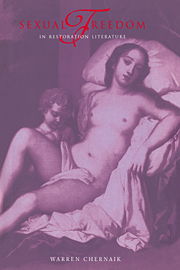Book contents
- Frontmatter
- Contents
- Acknowledgements
- Introduction: the imperfect enjoyment
- 1 Hobbes and the libertines
- 2 The tyranny of desire: sex and politics in Rochester
- 3 Absent from thee
- 4 Playing trick for trick: domestic rebellion and the female libertine
- 5 My masculine part: Aphra Behn and the androgynous imagination
- Conclusion
- Notes
- Index
5 - My masculine part: Aphra Behn and the androgynous imagination
Published online by Cambridge University Press: 04 September 2009
- Frontmatter
- Contents
- Acknowledgements
- Introduction: the imperfect enjoyment
- 1 Hobbes and the libertines
- 2 The tyranny of desire: sex and politics in Rochester
- 3 Absent from thee
- 4 Playing trick for trick: domestic rebellion and the female libertine
- 5 My masculine part: Aphra Behn and the androgynous imagination
- Conclusion
- Notes
- Index
Summary
Though Aphra Behn in a number of poems presents herself as a disciple of ‘the Great, the God-like Rochester’, citing ‘fam'd Strephon’ as inspiration and model for her own literary career, the two authors could hardly be more different in their social background and their characteristic literary stance. Where Rochester was an aristocrat, son of a distinguished father, writing lyric poems and satires designed for manuscript circulation in the court circle to which he belonged, Behn, whose parentage is unknown (as is the identity or ultimate fate of her shadowy husband), was ‘forced to write for Bread and not ashamed to owne it’. Existing precariously on the margins of society, imprisoned at one point for debt, complaining in one letter of ‘extreme want’ and in another bargaining with her publisher Tonson for an increase of £5 in her fee for a commissioned book, Behn was forced to be practical, to put a price on her talents.
Complaints of ‘want of money, having pawned her very rings’, of being unable ‘to buy so much as a shoe to travel in’, dire warnings that she was on the verge of being ‘ruined and disgraced in a strange place’, forced to ‘beg or starve’, echo through Behn's letters of 1666–8. She had been sent to the Netherlands on a mission of espionage during the Anglo-Dutch war, reporting on republican exiles, and ended up in a British prison, when her employer, Lord Arlington, refused to acknowledge her services and pay a debt of £150:
I must go to prison to-morrow if I have not the money to-night; they say I am dallied with, and will not allow a few days more. […]
- Type
- Chapter
- Information
- Sexual Freedom in Restoration Literature , pp. 160 - 213Publisher: Cambridge University PressPrint publication year: 1995



